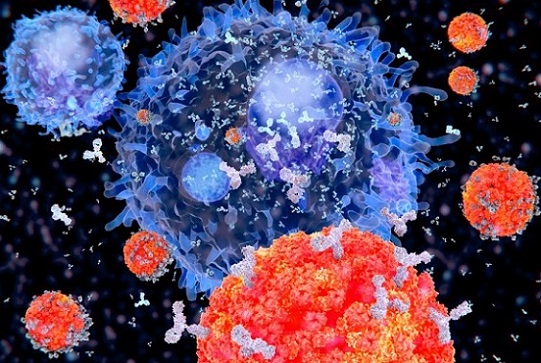Nikhil Prasad Fact checked by:Thailand Medical News Team Aug 31, 2025 5 months, 3 weeks, 2 days, 23 hours, 15 minutes ago
Medical News: A new study has uncovered important clues about how the immune system may be tied to lingering symptoms in people with Long COVID. The research was conducted by scientists from Universidad Rey Juan Carlos in Madrid, Spain, Aalborg University in Denmark, Hospital Universitario Doce de Octubre in Madrid, SYNLAB Diagnósticos Globales, Hospital Universitario Infanta Leonor-Virgen de la Torre, and Universidad Complutense de Madrid. This
Medical News report reveals that while overall complement system activity was not significantly different in people with or without Long COVID, certain immune proteins were linked to specific symptoms such as fatigue and shortness of breath.
 Complement Proteins Linked to Fatigue and Breathing Issues in Long COVID
The role of the complement system
Complement Proteins Linked to Fatigue and Breathing Issues in Long COVID
The role of the complement system
The complement system is a vital part of our immune defense. It helps fight infections but, if overactivated, can also damage healthy tissues. During the acute phase of COVID-19, researchers found that the complement system often goes into overdrive, especially in severe cases, consuming key proteins like C3 and C4. This raised questions about whether the same process continues months or years later in people with Long COVID.
To answer this, researchers studied 88 COVID-19 survivors, of which 57 reported ongoing symptoms and 27 did not. Participants were evaluated around two years after infection. Blood samples were analyzed for four key proteins—C3, C4, C5, and C7—along with total complement activity (CH50).
Key findings from the study
The study found no major differences in overall complement activation between people with Long COVID and those who had recovered without lasting symptoms. However, when looking closely at specific complaints, striking patterns appeared. People with post-COVID fatigue showed lower levels of the C3 protein, while those with post-COVID dyspnea (difficulty breathing) showed lower levels of C3, C5, and C7 proteins. These decreases suggest that the immune system might still be in a state of activation, consuming these proteins and potentially driving inflammation.
Interestingly, patients with fatigue or dyspnea also reported higher disability levels, worse anxiety and depression scores, and poorer sleep compared to those without these symptoms. This highlights how immune changes may directly influence both physical and mental health in Long COVID.
What this means for treatment
The study points to the possibility that therapies targeting specific complement proteins might help ease certain Long COVID symptoms. For example, C5 inhibitors have already been tested in severe COVID-19 cases during the acute phase, and researchers believe they could also benefit those with long-term breathing issues. More research and clinical trials will be needed, but the findings open the door for new treatment strategies tailored to different symptom clusters.
Final thoughts
The findings provide valuable insight
s into how persistent immune changes may explain why some people struggle with lingering fatigue and breathing problems years after infection. While the study did not show widespread complement hyperactivation across all Long COVID patients, it clearly identified links between certain complement proteins and specific symptoms. This adds to growing evidence that Long COVID is not one single condition but a group of disorders with different underlying biological drivers. Understanding these immune pathways may help in designing targeted therapies that could finally bring relief to millions still suffering worldwide.
The study findings were published in the peer reviewed International Journal of Infectious Diseases.
https://www.sciencedirect.com/science/article/pii/S1201971225002541
For the latest on Long COVID, keep on logging to Thailand
Medical News.
Read Also:
https://www.thailandmedical.news/news/complement-proteins-may-shape-covid-19-severity
https://www.thailandmedical.news/news/sars-cov-2-suppresses-membrane-complement-regulatory-proteins-making-blood-vessels-more-vulnerable-to-damage-
https://www.thailandmedical.news/news/study-finds-that-30-percent-of-human-anti-glycan-antibodies-fail-to-activate-the-complement-system
